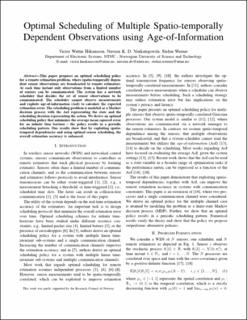| dc.contributor.author | Håkansson, Victor Wattin | |
| dc.contributor.author | Dasanadoddi Venkategowda, Naveen Kumar | |
| dc.contributor.author | Werner, Stefan | |
| dc.date.accessioned | 2021-11-09T09:17:50Z | |
| dc.date.available | 2021-11-09T09:17:50Z | |
| dc.date.created | 2021-09-03T14:06:04Z | |
| dc.date.issued | 2020 | |
| dc.identifier.isbn | 978-1-6654-4707-2 | |
| dc.identifier.uri | https://hdl.handle.net/11250/2828593 | |
| dc.description.abstract | This paper proposes an optimal scheduling policy for a remote estimation problem, where spatio-temporally dependent sensor observations are broadcasted to remote estimators. At each time instant only observations from a limited number of sensors can be communicated. The system has a network scheduler that decides the set of sensor observations to be communicated. The scheduler cannot observe measurements and exploits age-of-information (AoI) to calculate the expected estimation error. The scheduling problem is modeled as a Markov decision process with the AoI representing the state and the scheduling decision representing the action. We derive an optimal scheduling policy that minimizes the average mean squared error for an infinite time horizon - the policy results in a periodic scheduling pattern. Our results show that by exploiting spatiotemporal dependencies and using optimal sensor scheduling, the overall estimation accuracy is enhanced. | en_US |
| dc.language.iso | eng | en_US |
| dc.publisher | Institute of Electrical and Electronics Engineers (IEEE) | en_US |
| dc.relation.ispartof | The Fifty-Fourth Asilomar Conference on Signals, Systems & Computers | |
| dc.title | Optimal scheduling of multiple spatio-temporally dependent observations using age-of-information | en_US |
| dc.type | Chapter | en_US |
| dc.description.version | acceptedVersion | en_US |
| dc.rights.holder | © IEEE. Personal use of this material is permitted. Permission from IEEE must be obtained for all other uses, in any current or future media, including reprinting/republishing this material for advertising or promotional purposes, creating new collective works, for resale or redistribution to servers or lists, or reuse of any copyrighted component of this work in other works. | en_US |
| dc.identifier.doi | 10.1109/IEEECONF51394.2020.9443555 | |
| dc.identifier.cristin | 1931184 | |
| dc.relation.project | Norges forskningsråd: 274717 | en_US |
| cristin.ispublished | true | |
| cristin.fulltext | postprint | |
| cristin.qualitycode | 1 | |
